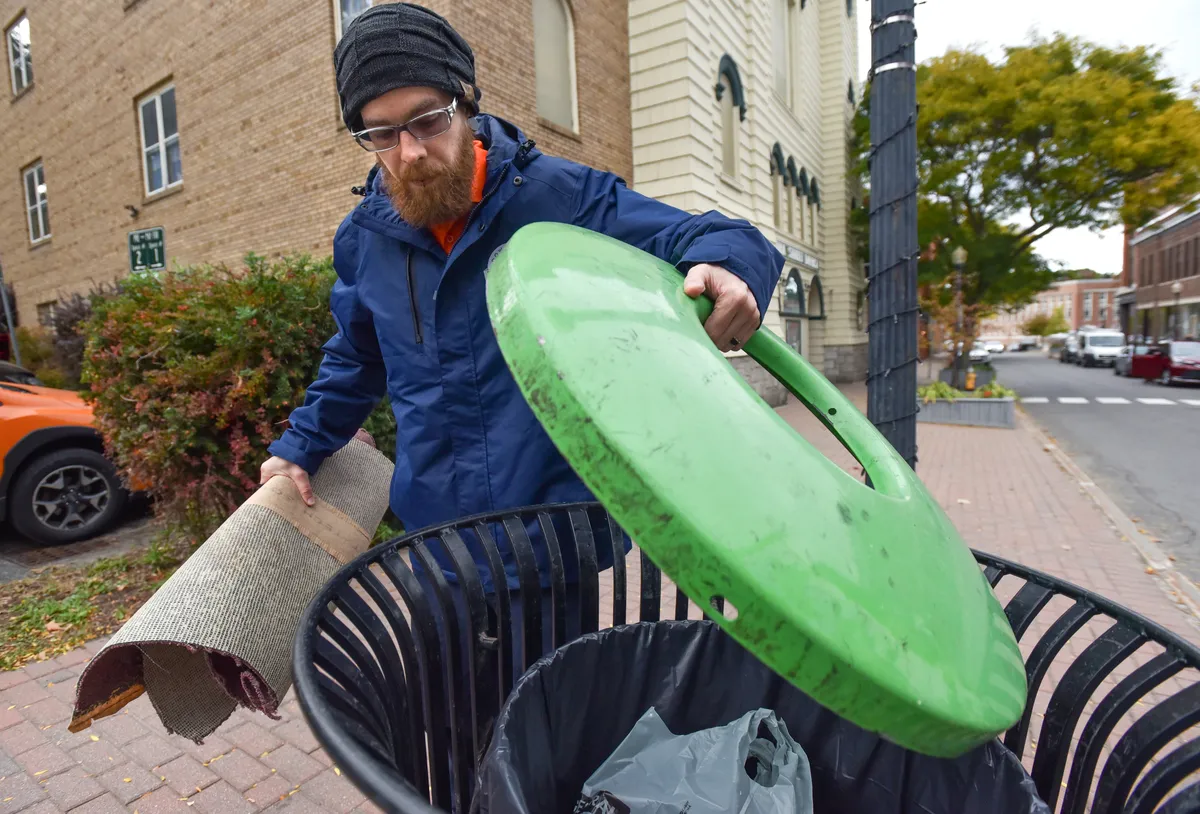Copyright Bangor Daily News

It’s been a year since Streetplus ambassadors clad in bright orange shirts began patrolling downtown Bangor. The six-person staff is tasked with monitoring downtown, cleaning up public spaces and making the city feel more safe for residents and visitors. Some community members, especially business owners, feel the new service has improved their experience of downtown. In July and August this year, the team cleaned up 541 needles, conducted 57 wellness checks and removed graffiti three times, according to a report submitted to City Council this month. But others complain that they haven’t seen the ambassadors around as much as they’d like and they don’t think the program’s $310,000 price tag is worth it. Advocates stress that the program is helping, but that its work is often invisible to members of the public. Debates around the initiative and its effectiveness point to larger issues of perceptions of safety in downtown Bangor, especially when it comes to the city’s homeless residents. These questions are frequently political flashpoints, and City Council hopefuls campaigning this fall have often referenced plans to make Bangor feel more safe. The annual budget for the program, which is staffed through a three-year contract with the New York-based Streetplus organization, is $310,000. Part of that is funded through the Downtown Bangor Partnership, a nonprofit, via a special assessment tax on downtown property owners. On top of that, the city reimburses up to $230,000 a year out of the downtown tax increment financing fund, which is separate from the general fund, according to the nonprofit’s executive director, Betsy Lundy. In the last year, she said, the city ended up contributing $193,000. Lundy stressed she believes the expense is worth it. “For years and years and years we heard from our downtown constituents that safety and security was their number one issue,” Lundy said. She noted major cuts to the city’s staff over the last decade and its relatively small Parks and Recreation department given the city’s size as a reason why Bangor needed more support. The Streetplus team tries to help the city in a variety of ways, according to ambassador Mike Brown, and the job can change every day. “We clean up the street, make sure it’s safe, but also just kind of interact,” Brown said. That can include patrolling areas where problems have arisen in the past, responding to requests for help from business owners or informing police of criminal activity. While Streetplus doesn’t have the power to enforce rules in public spaces like police do, part of their job also involves letting people know when they’re violating them, according to Lundy. Most of the time, people are receptive when told they need to stop doing something — like camping somewhere they’re not allowed to — she added. This work is typically done at night or in secluded alleys with the goal of solving or preventing problems before they become visible to members of the public, Lundy said. That has made some community members skeptical of the program, saying that they don’t see any results from the work the ambassadors are doing. “When I talk to people downtown and when I go down five days a week, just kind of riding around, I don’t see them around,” City Councilor Susan Hawes said at a committee meeting this month. She later told the Bangor Daily News that while she loved the idea of having dedicated staff downtown to interact with the public, “I personally have zero faith in the program.” The BDN spoke with numerous Bangor area residents downtown and in city parks about Streetplus. Most of them hadn’t heard of the program, but some said they liked the idea after learning what it was. “I think it’s a good idea, especially if it keeps things clean,” said Ashley, a Hermon resident who declined to share her last name. She said she used to bring her children to Bangor’s waterfront but doesn’t go anymore because she feels unsafe around the city’s homeless population. Craig Stevens, a Brewer resident who works in downtown Bangor, said he sees Streetplus workers sometimes in West Market Square. “They’ve got their work cut out for them,” he said. Stevens said he feels downtown has improved a lot in the last year — although he attributed that to the introduction of Bangor’s downtown walking beat cop, who started a few months before the Streetplus team. Some say they’d be more supportive if the ambassadors were more visible. “That’s what I would want to see more of is, are you out there in the street talking to people, forming relationships?” said City Councilor Michael Beck. “I completely understand why people would want to see them more, but the reality is the greatest work that needs to be done is in the places where not everyone is looking,” Lundy said. Streetplus prioritizes coverage during nights and weekends because the downtown walking beat cop and the Public Works department’s downtown custodian work during the day, according to Lundy. She said the ambassadors have staff downtown seven days a week, mostly between noon and 6 a.m. The nighttime staffing proved helpful one night when Brown was patrolling at 5 a.m. and found a dumpster fire behind Print Bangor on Central Street. “They caught it just in time” before the fire could damage the building, said owner Elena Metzger. “We are very thankful that they are walking around town checking everything out.” Ambassadors have been working to build relationships with businesses so employees know they can ask them for help with issues that don’t necessarily rise to the level of police involvement, according to Brown. “We want the businesses to know that they have someone they can call,” he said. Much of the positive feedback about the program has come from business owners, Beck said. He recalled talking to a downtown employee who called Streetplus for help when someone was overdosing in their store and then ambassadors came to help. While Streetplus has the stated goal of helping residents in those precarious situations, the program has drawn mixed reviews from the city’s homeless community. One homeless resident, Stephen Morey, said he tries to stay away from the ambassadors because he’s heard that they can make things more difficult for people like him. But another homeless community member, Timothy Neilson, said he thinks they’re doing a good job and he’s more concerned about interacting with the police. Part of the ambassadors’ job includes checking on people downtown and sometimes asking them to move. A Streetplus report submitted to City Council earlier this month advertises that ambassadors keep tabs on areas frequented by homeless people, including one image of Central Street captioned, “Clear sidewalk after several unhoused individuals were cleared out by Ambassadors.” Beck, who initially supported the program, said he’s become concerned after hearing from homeless community members who feel they’re being “kind of shoved along.” “There’s nowhere for them to go. You’re telling someone to get off a sidewalk or get off of a property or get out of a park. Where do they go?” he asked. The city’s shelters frequently have to turn people away because they’ve reached capacity, and there are fewer daytime spaces for homeless people to go after the nonprofit Health Equity Alliance shut down earlier this year. “People are only moved from places that they’re not allowed to be,” said Lundy, who acknowledged that it’s a tricky position to be in where there aren’t many places to send homeless residents who need help. Brown, who grew up in Bangor and was homeless in the city 20 years ago, said he tries to point people toward churches and other organizations that provide food and services. In the winter, he said, more of his focus will shift toward ensuring the safety of people on the streets and getting them to warming shelters. He added that he sees his job as a balance between maintaining safety in the city while being compassionate toward people who are breaking rules because they’re in difficult situations. Beck sees the challenges around the program’s relationship to the homeless community as a reminder that the city needs to address more than just the symptoms of homelessness, he told fellow councilors at a committee meeting. It’d be easier to mitigate those symptoms, he told the BDN, if the council was also working to fund more places for homeless people to go and get connected to services. Some councilors believe there are more worthwhile ways to spend the money that funds Streetplus. “If I could get out of the contract I would,” Hawes said. “We’re spending a lot that we’re not getting a lot back on.” Some say the city could consider spending more on law enforcement instead. “It gets into a question of, for the amount of money we’re paying for Streetplus, do you look at funding additional police officers downtown?” Beck said. Bangor resident Sonali Paradis said she thinks the spending is worth it after learning what the program was. She said she goes downtown around once a week to visit museums, restaurants or the public library with her children. “There’s no easy fix” to problems that sometimes make her nervous walking around downtown, especially at night, Paradis said. She added that she’s frustrated when she hears people say they avoid downtown because of safety concerns, and programs like Streetplus could be a part of helping everyone. She wondered if aspects of the program could be expanded to include high school students looking to get involved in community service. “Everyone who walks downtown is affected,” she said.



